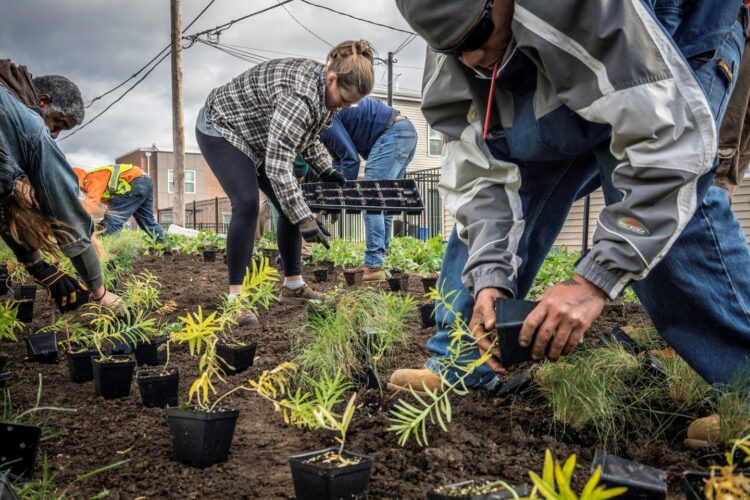Taking lessons learned from a decade of funding over 100 adaptation initiatives in conservation through the WCS Climate Adaptation Fund, authors offer a rapid assessment framework that can be used to facilitate climate-informed conservation and nature-bas
A new article, published as a Perspective in the journal Conservation Science and Practice, introduces a rapid assessment framework that can be used as a guide to make conservation and nature-based solutions more robust to future climate.
Climate change poses risks to conservation efforts, if practitioners assume a future climate similar to the past or present. For example, more frequent and intense disturbances, such as wildfire or drought-induced tree mortality, can threaten projects that are designed to enhance habitat for forest-dependent species and sequester carbon. Overlooking such climate-related risks can result in failed conservation investments and negative outcomes for people, biodiversity, and ecosystem integrity as well as lead to carbon-sink reversal. Drawing from lessons learned from a decade of funding over 100 adaptation initiatives through the WCS Climate Adaptation Fund, the authors offer a simple framework that enables users to rapidly assess how–and by what means–climate change will require innovation beyond business-as-usual conservation practice.
This tractable assessment encourages practitioners and funders to use the “what, when, where, why, and who”–or the “5Ws”–of climate-informed action as a tool in project design and implementation. The “what,” for example, means considering whether climate variability and projected changes will require taking new actions or modifying existing actions. The “who” asks users to consider: by whom, with whom, who benefits and who might bear potential harm or tradeoffs from project implementation and anticipated outcomes.
Using the 5Ws in practice can result in doing conservation differently in the warming world and help practitioners achieve their desired objectives. They use available science and local knowledge to address climate risks to traditional investments in reforestation, fire management, watershed restoration, and habitat protection. Take reforestation as an example: a traditional approach might aim to enhance habitat and carbon sequestration using seed or seedlings from historically-dominant tree species. Tree mortality due to unsuitable climate conditions could then lead to unexpected habitat degradation and reductions in carbon sequestration. A climate-informed approach favors native species that are expected to thrive under future climate. Seed or seedlings can be sourced from warmer and/or drier locations to assist migration to climatically-suitable areas. The 5Ws facilitates this process of figuring out what, if anything, should be done differently from the status quo.
“There’s such a pressing need for adaptation,” notes Lauren E. Oakes, the article’s lead author. “So, we need to mainstream strategic actions that are robust to future climate change into conservation efforts and nature-based solutions across the world.” There is a breadth of rigorous tools available for adaptation practitioners, but the complexity cost and time required to use them can stall their broad uptake. Oakes says the “5Ws” offers an initial, less daunting entry into the climate-informed planning process for practitioners endeavoring to make their projects more robust to future conditions. The authors offer this rapid assessment as a pathway to broader adoption of adaptation planning, an urgent need as investments in nature-based solutions continue to ramp up.
###
The article was co-authored by Lauren E. Oakes and Molly S. Cross, researchers on the Forests and Climate Change team at the WCS Global Conservation Program, and Erika Zavaleta, Professor at the University of California-Santa Cruz and former advisor to the Climate Adaptation Fund.
The WCS Climate Adaptation Fund is a program made possible through the generous support of the Doris Duke Charitable Foundation.
About the Wildlife Conservation Society
WCS saves wildlife and wild places worldwide through science, conservation action, education, and inspiring people to value nature. To achieve our mission, WCS, based at the Bronx Zoo, harnesses the power of its Global Conservation Program in nearly 60 nations and in all the world’s oceans and its five wildlife parks in New York City, visited by 4 million people annually. WCS combines its expertise in the field, zoos, and aquarium to achieve its conservation mission. Visit: newsroom.wcs.org Follow: @WCSNewsroom. For more information: 347-840-1242.
About the Climate Adaptation Fund
The WCS Climate Adaptation Fund is a re-granting program for projects that advances effective interventions to help wildlife, ecosystems, and people adapt to climate change. Since 2011, the Fund has invested over $21 million in grant awards to U.S. conservation non-profits to catalyze innovative, science-driven projects responding to the impacts of climate change. To learn more, visit https:/
About the Doris Duke Charitable Foundation and the Environment Program
The mission of the Doris Duke Charitable Foundation (DDCF) is to improve the quality of people’s lives through grants supporting the performing arts, environmental conservation, medical research and child well-being, and through preservation of the cultural and environmental legacy of Doris Duke’s properties. The mission of DDCF’s Environment Program is to ensure a thriving, resilient environment for wildlife and people, and foster an inclusive, effective conservation movement. For more information, please visit http://www.
Media Contact
Stephen Sautner
[email protected]
Original Source
https:/
Related Journal Article
http://dx.





